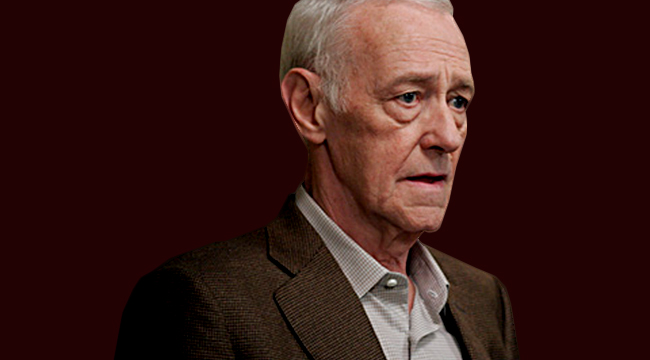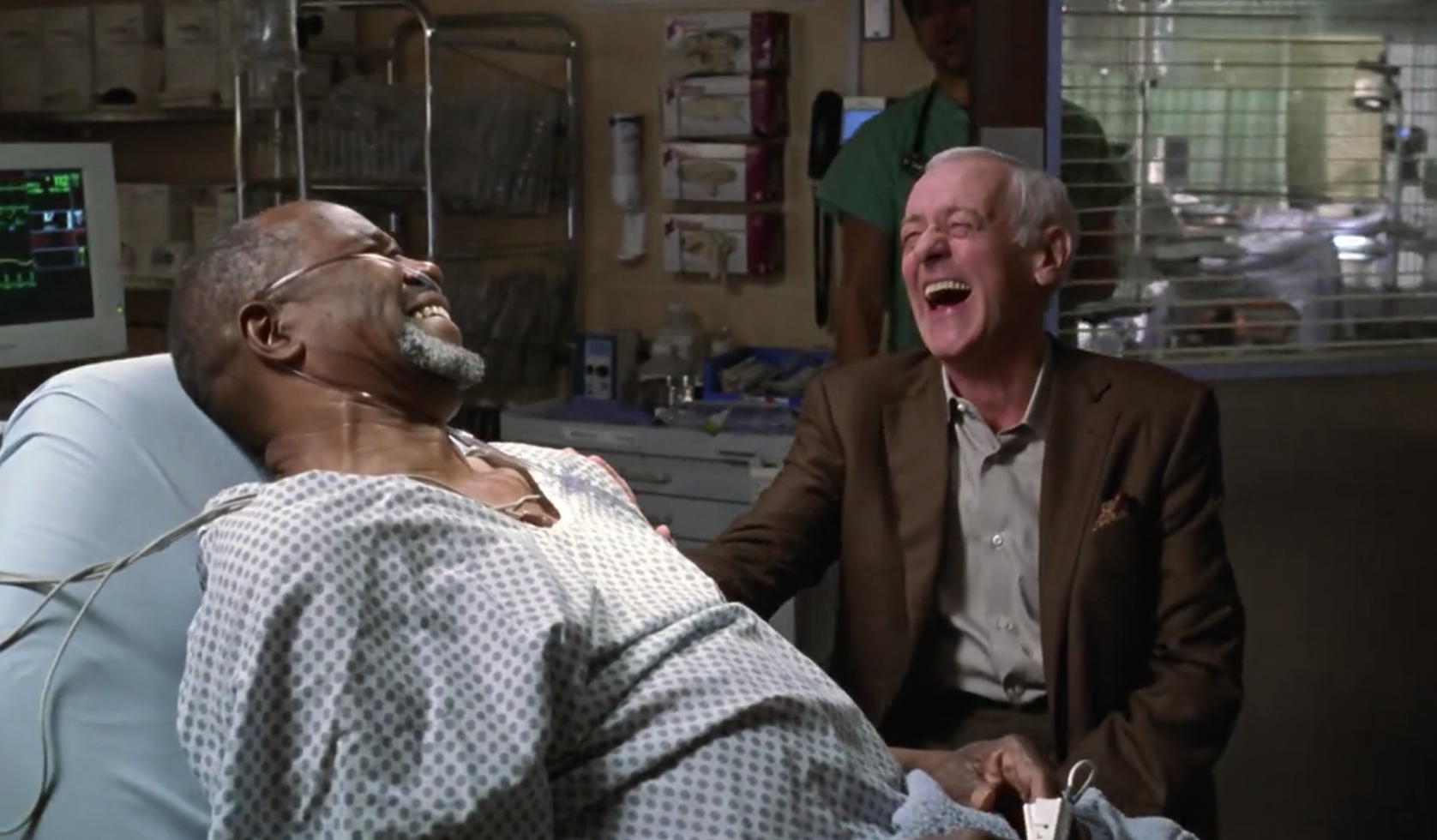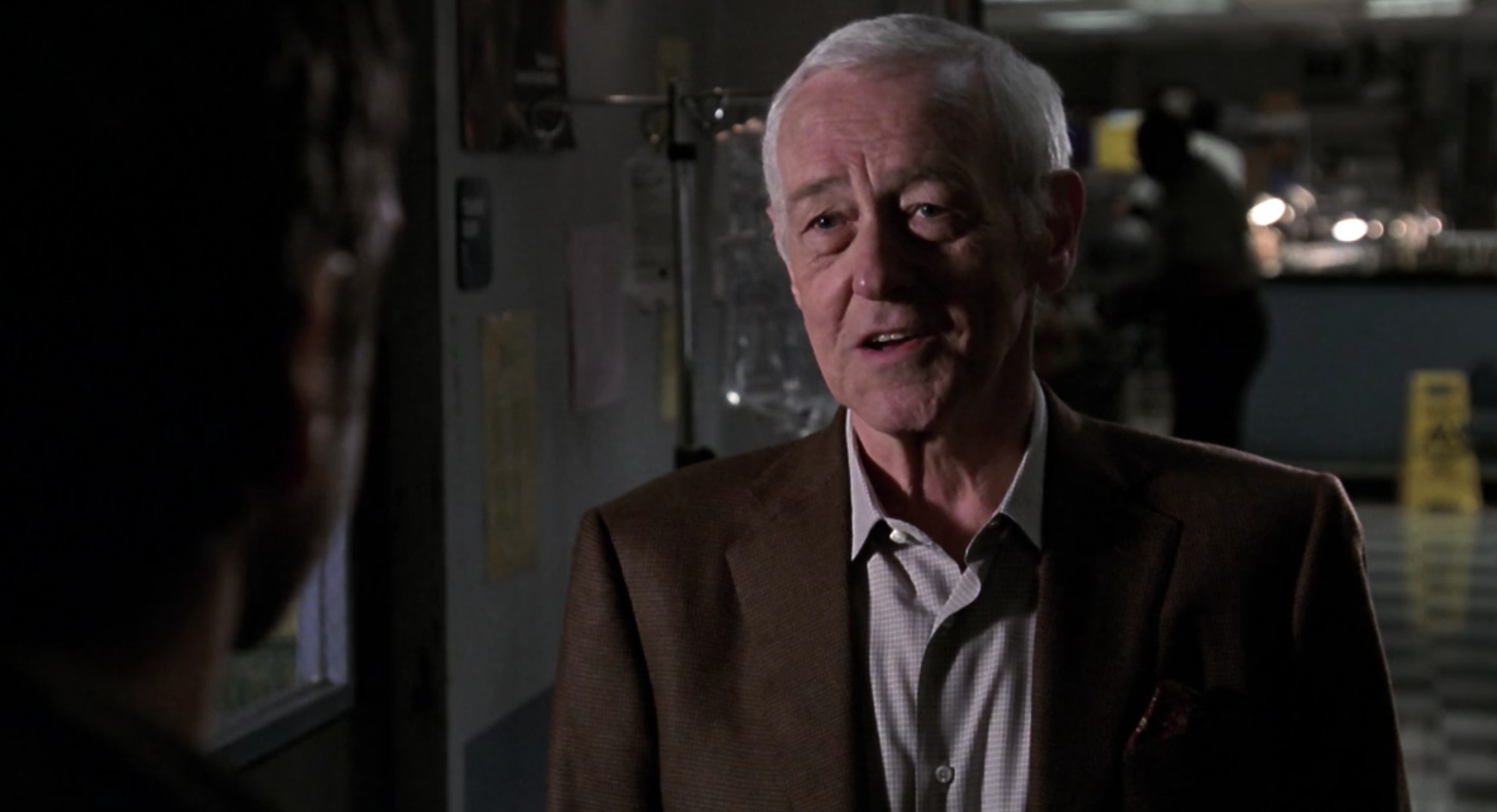
John Mahoney played Martin Crane on Frasier for 11 seasons and had memorable roles in Say Anything…, Moonstruck, Barton Fink, and on the stage in New York and in Chicago. It’s natural that those highlights have defined his career in the appreciations that have appeared since his death yesterday. That’s how we condense almost 40 years of work so that it fits a headline or an article: with a couple of titles and distinctions like “character actor” or “supporting actor” when someone wasn’t usually cast as the lead. But of course, there was so much more, deep cuts that deserve remembrance and revisitation.
One of the first Mahoney roles I thought of when I learned he had died was a one-off 2006 appearance in the 13th season of ER where he played a closeted gay man and drag performer who is wrapped in a waking nightmare when his partner, James (Albert Hall), is rushed to the hospital with heart trouble.
ER’s best work came early in its run when an uncommonly talented ensemble tackled material that often focused on the tragedies and chaos that emergency room doctors and nurses deal with every day. It all felt remarkably fresh and daring at the time, but as other talented actors came and went, the show mostly struggled to stand out from its past with an increasing reliance on personal melodrama and by-now overly familiar character types and stories. 331 episodes is a lot of television, is what I’m saying.
I rewatched “Somebody To Love” last night and found the series in a broader place then I had remembered. One doctor (Scott Grimes) is late for his rounds because he just bought a new convertible and we find this out because we see him driving with the top down singing the theme song from The Greatest American Hero. A woman is shouting that she’s going to get (then Senator) Barack Obama involved in her alleged mistreatment by the hospital staff. And when we’re reintroduced to a desk clerk (Glenn Plummer) from the show’s early days, he matter-of-factly drops this bit of dialogue.
“I lived in the Kalahari for a while, selling biltong outside of Kakamas. Then I spent a couple years mining uranium in the Siberian tundra. Ran into a misunderstanding in Thailand, that landed me in the Bangkwang prison. But most of the ’90s is still a blur. […] Hell, I’d take Bangkwang over ER this time of year. As you know, them new interns will mess you up worse than Chinese hash.”
What?
Mahoney is understated by comparison, looking slightly more aged and frail then he had at the end of Frasier just a few years prior. Though his eyes are wide and filled with panic as he enters County General Hospital in search of James, his actions are subdued as he introduces himself as James’ business partner. Around former rebel-EMT-turned rebel doctor Tony Gates (John Stamos), however, he lets his guard down, explaining that he’s gotten used to pretending that he and James aren’t in a relationship when around strangers — even after 15 years together.

As James gets progressively worse, it’s revealed that he doesn’t want to continue on, rejecting the idea of dialysis instantly. It’s been a long road filled with sickness and limitations for him, but Bennett passionately pleads with him and eventually, he relents, agreeing to the treatment before asking Bennett to call his family and tell them what’s going on. Unfortunately for Bennett and James, Gates botches his medicine, leading to an overdose of calcium and catastrophic heart failure. Though Gates tries to redeem himself, going against the orders of his boss (Mekhi Phifer) to offer restorative treatment, the effort is, ultimately, unsuccessful. James’ mind is irretrievably gone.
The central conflict in the episode isn’t between Bennett and the doctor who screws up his partner’s meds, however, it’s between Bennett and James’ family. Specifically, his brother, Harold (John Lafayette), who is cold and dismissive of Bennett’s role in James’ life for the last 15 years, even though the family has been estranged from James for that long. It’s remarkable that Bennett is able to stop himself from exploding on the family as they try to push him out of the room, but you can see his fear and anger building in Mahoney’s face, and eventually it bubbles to the surface as Bennett and Harold battle over whether to try and save James’ life or not.
Harold: And who’s gonna take care of him? You?
Bennett: I always have.
Harold: We’re his blood. We don’t think he’d wanna suffer through all this.
Bennett: You don’t know that. You don’t know him. But I do. I love him. I love him!
It’s a heartbreaking moment thanks to Mahoney’s performance and because this nightmare scenario has real-life roots in a country that has been woefully slow in completely and unquestionably acknowledging the rights of same-sex partners and unmarried couples.

At the end of the episode, aware and accepting of James’ ultimate fate (perhaps, in part, because he knew that he was the driving force behind James’ willingness to keep enduring), Bennett absolves Dr. Gates for his screw-up. He tells him, before leaving for a performance (which James had demanded he not skip), that his drag career has instilled in him an ability to hold out hope for a recovery that won’t come.
“As bad as it all may sound, I belong to a rare tribe constitutionally incapable of giving up on fantasy. If I can get up like a lady and sell a torch song to a crowd then I sure as hell can hold onto the hope that maybe, somehow Jimmy’s gonna be okay. […]
We are all liars, just like they said. The makeup, the wig, the padded dress. All a beautiful lie we tell ourselves. But it makes us feel better.”
It’s concerning how we assign lasting value to performances nominated for awards over those that were equally as impressive but which somehow didn’t get the right kind of buzz or have the right kind of luck. We often forget about or ignore exemplary work done on shows that are no longer favored by critics. The role of Bennett Cray in the waning seasons of ER is one of those performances: it didn’t get recognition and it’s easily passed over when reviewing Mahoney’s impressive IMDb page. But it’s also one that — at least for me — is impossible to forget. Through roles large and small and projects lengthy and brief, Mahoney had the capacity to make you feel something and connect you with a story. Which just proves the adage that there are no small roles and that John Mahoney was no small actor.






